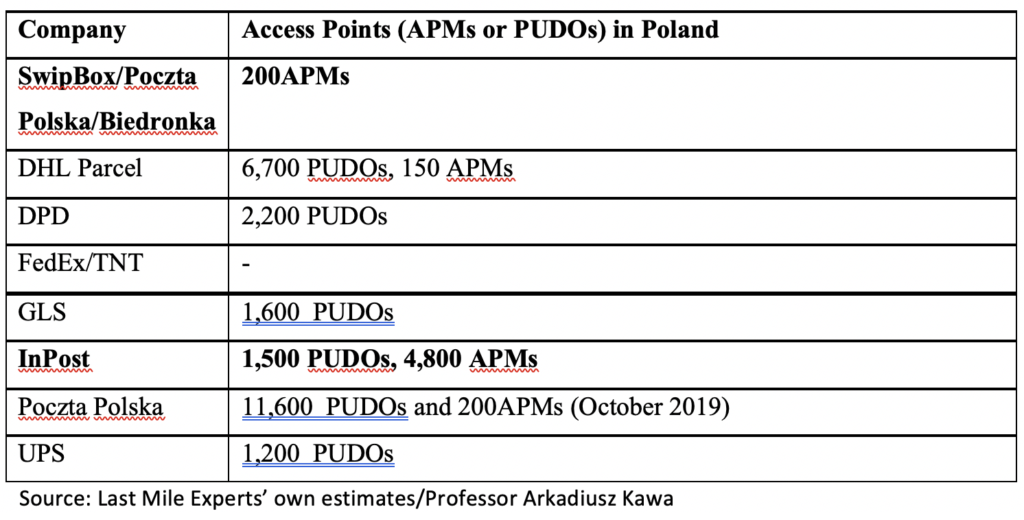The Polish e-commerce market is booming. Read how out-of-home delivery is crucial to its success. Analysis from Marek Różycki and Prof. Arkadiusz Kawa (Last Mile Experts).
The Polish CEP market is one of the most dynamic in Europe, fueled largely by e-commerce growth and good domestic demand. Last year, it grew by some 13-15% and this trend is expected to continue, despite an anticipated economic slowdown. E-commerce can expect a further boost when the domestic e-commerce giant, Allegro, is joined by Amazon, which is expected to enter the market by the end of 2020.
Historically, Polish carriers have offered good ‘door-to-door’ (DTD) service and have focused efforts on improving this via interactive delivery management and other associated tools. But now, with issues of capacity and customers demanding more choice and better returns services, there is a need for alternative out-of-home (OOH) options.
This view is confirmed by Rafał Brzoska, founder and CEO of the Integer Group, which produces and sells InPost parcel lockers: “The Polish logistics market is on the verge of a revolution that will shake it, and it will happen faster than we think. Amazon’s entry to Poland is inevitable. As the market leader, we are not only undaunted by its appearance, but we are waiting for it, because it will render Polish e-commerce more dynamic.
“The consequence of the lack of available labor and an increase in fixed costs will be the shrinking significance of DTD courier services, which will become more expensive and transform into a premium service. Instead, the share of OOH deliveries, i.e. the PUDO and the InPost parcel lockers, will grow. Today, up to 52% of online shoppers use our parcel lockers. In the coming years, this proportion will change in favor of OOH as more and more sellers, like Allegro, offer free deliveries, while preferring OOH deliveries.”

To date, InPost has been the ‘king of out-of-home’ with its early entry into the postal market – which required several thousand PUDOs – and then its virtually single-handed development of the APM (locker) market. While one could argue that InPost has needlessly lost much of its advantage in PUDOs – this seems to have become an ‘unwanted child’ after the company capitulated in its battle with Poczta Polska (Polish Post) for the letter market – it now has close to 5,000 APMs in Poland, which distances it by far from even the largest competitors (Poczta Polska and Denmark’s SwipBox).
According to Prof. Arkadiusz Kawa, director at Łukasiewicz Research Network – The Institute of Logistics and Warehousing and Last Mile Experts (LME) PRO Partner, “Things are really happening in out-of-home delivery in Poland. PUDOs are available at scale and now more and more operators are looking at APMs.”
But is InPost’s position unassailable? How many networks can profitably exist in this market? Who will be the challenger? Let’s answer these questions, in turn.
Is InPost’s position unassailable?
Of course, InPost is strong, but as it operates a closed network by virtue of its competition with other carriers in last-mile to-door delivery, it is unable to use other carriers’ volumes to support even faster growth. Having said that, InPost’s growth is tremendous with just the e-commerce (mainly Allegro) business it has today. A new, open network could, however, harness carrier and other e-commerce volumes to allow for growth and to challenge InPost, especially if this network harnesses the power of PUDOs to support its locker business. It’s not just SwipBox that’s looking to install APMs in Poland. Several local consolidators have been investigating options for enhancing their network capability with lockers.
Brzoska remains confident, noting, “We are calmly observing announcements of competitors declaring the construction of a network of devices similar to our parcel lockers. I think that they will soon find out that it is not enough to erect the machines themselves. As important as they are, they form only the final link of a complex logistics chain. This unique experience is the result of many years of research and work, which is appreciated by our partners. I think that in the coming weeks we will be able to provide information that will come as a big surprise for the industry.”
How many OOH networks can profitably exist in Poland?
This is, of course, the million-dollar question. Our feeling at LME is that there is room for one, possibly two further networks. Once these achieve scale and proximity, it will be very hard for anyone to compete, unless some disruptive technology comes to play. (We actually have some ideas here, but they will be a subject of a future piece we will write.)
Who will be the challenger?
The obvious challenger, today, is the SwipBox/Poczta Polska tandem, which has signed an agreement to put lockers in or next to Biedronka stores, Poland’s leading retailer with some 3,000 stores nationwide. If they are smart, they will seek to offer an open network, available to all players. But we also see a very dangerous ‘stealth competitor’ on the horizon in the shape of Amazon. If our information is correct, and the e-commerce behemoth comes in before the end of next year, things will really hot up down by the Vistula river. Of course, Amazon will create another closed network, available only for its own and Fulfilled by Amazon parcels, so the issue here will be more a question of how much e-commerce volume it is able to take from the market, and in turn from InPost, or whether InPost will be able to offer its network to Amazon on terms that the giant, not known for compromises, will accept.
Justyna Siwek, spokesperson for Poczta Polska, is clear about its focus on OOH: “Poczta Polska is a leader in terms of access points, with over 11,600 in place. We are continually seeking to innovate and have recently started building a locker network, which will have 200 APMs by the end of October. Customers appreciate proximity and flexible access times, which has led to our out-of-home parcel volumes growing by some 100% in the first half of this year.”
Michał Czechowski, managing director of Swipbox Polska, Poczta Polska’s partner, adds, “In Poland, over 50% of deliveries are carried out in the traditional ‘home delivery’ model, generating challenges for the entire e-commerce sector. It’s the main reason for alternative solutions such as parcel lockers and manned PUDOs’ increasing popularity. They respond to current trends and consumers’ expectations. Located close to places of residence or work, customers use them primarily because of the convenience of such solutions and the time-saving factor, crucial especially in large cities.”
Whatever happens next, Poland is set to become a major OOH battleground. While we feel that the APM-powered fortress InPost has been building is strong enough to compete with a new open network, the key to any final outcome will be ‘all about Amazon’. If the giant decides to go head to head with Allegro, InPost’s most important client, things can change dramatically – and fast. Whatever happens next, things will be exciting in Poland over the next few years!
Bios
 Professor Arkadiusz Kawa is director at Łukasiewicz Research Network – The Institute of Logistics and Warehousing, and Last Mile Experts PRO Partner.
Professor Arkadiusz Kawa is director at Łukasiewicz Research Network – The Institute of Logistics and Warehousing, and Last Mile Experts PRO Partner.
 Marek Różycki is managing partner at Last Mile Experts, specializing in CEP and e-commerce last-mile advisory.
Marek Różycki is managing partner at Last Mile Experts, specializing in CEP and e-commerce last-mile advisory.
Interested in PUDOs and lockers? Marek Różycki will be leading a workshop dedicated to the topic at the Parcel+Post Expo Conference this October. He will also be moderating the session on intelligent self-service solutions, which includes presentations from the French postal service La Poste and from Smartmile.


